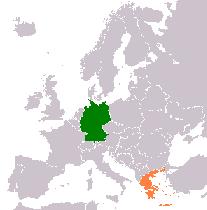Crisis in Greece
Eyes on Germany as debt crisis spreads
 Angela Merkel, German chancellor, pledged on Wednesday to step up efforts to overcome the Greek fiscal crisis as Standard & Poor's downgraded Spain and investors sold bonds in Europe's most indebted nations.
Angela Merkel, German chancellor, pledged on Wednesday to step up efforts to overcome the Greek fiscal crisis as Standard & Poor's downgraded Spain and investors sold bonds in Europe's most indebted nations.
Eurozone governments, especially Germany's, have been under fire for delaying approval of a rescue plan for Athens that experts said should have been launched several months ago.
Ms Merkel has been insisting on more drastic austerity measures from the Greek government before committing her money. Politicians and economists said they had some sympathy with that position but the increasing mayhem on financial markets and the growing threats to the stability of the euro area and its banking system made rapid action essential.
"Since January of this year, fully four months ago, the eurozone has looked in vain for leadership from Germany," said Poul Nyrup Rasmussen, president of the party of European Socialists. "However, all this time Merkel has decided to put local politics above international solidarity."
"Far too much time has been wasted on inaction," said Angel Gurría, secretary-general of the Paris-based Organisation for Economic Co-operation and Development.
"We should have intervened two or three months ago. The markets have developed negatively since then, unnecessarily. That's why we have to act now, quickly and decisively," he told German radio.
What Greece's debt rating downgrade means
Of the three largest eurozone countries, Germany and France are planning to hold parliamentary votes next week on a rescue package for Greece, likely to consist of at least €30bn ($40bn, £26bn) from eurozone countries and as much as €25bn from the International Monetary Fund.
Meanwhile, the Italian government can avoid a drawn-out parliamentary process by passing an instant decree law on providing assistance to Greece. Rome, with its exceptionally high public debt, has every interest in seeing swift action in order to prevent contagion from spreading to the Italian government bond market.
But with Greek bond yields surging out of control and credit default swaps linked to Greek bonds soaring to record highs, some economists said eurozone governments were still not responding with enough urgency.
"Even next week sounds like it could be too far away in the current crisis," said Julian Callow of Barclays Capital Research.
Greek austerity measures prompt strike
Some politicians defended Ms Merkel. "Germany is removing its remaining doubts and questions over its engagement and therefore Europe's engagement," François Baroin, France's budget minister, told a parliamentary hearing.
Public finance specialists said Ms Merkel was on solid ground in demanding tougher measures from Greece's government to slash its budget deficit, estimated last year at about 14 per cent of gross domestic product. Even a cursory glance at an economic programme Greece submitted early this year to the European Commission seemed to justify the markets' lack of faith in Greek policies, said Daniel Gros of the Centre for European Policy Studies think-tank in Brussels.
"The hard choices and unavoidable cuts have been postponed," he said. "All the cuts so far have been on the public sector wage bill. This is a convenient target but, in reality, it does not constitute the main problem of the country."
"The Greek crisis has been so severely mishandled by European policymakers that markets legitimately fear matters are now beyond repair," said Alessandro Leipold, former acting director of the IMF's European department.
In an analysis for the Brussels-based Lisbon Council think-tank, he wrote: "Procrastination can be fatally toxic for countries hit by financial turbulence. The harm wreaked by delays in the Greek case is all too manifest ..."
On Wednesday Ms Merkel injected a sense of urgency. "It's completely clear that the negotiations between the Greek government, the European Commission and the IMF need to be speeded up now," she said. Flanked by Dominique Strauss-Kahn, IMF managing director, she said the "stability of the eurozone" was at stake if a loan package for Greece could not be delivered quickly.
German and French ministers insisted that Athens' troubles were unique. "The situation in Portugal is not the same as in Greece. The debt level is important but the Portuguese did not lie," Mr Baroin said.
(Published by CNN - April 29, 2010)